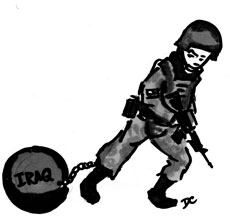Staff editorial: Upfront about the front

Online Poster
Dec 9, 2004
Last updated on May 11, 2016 at 05:45 p.m.
Three days after the Sept. 11, 2001, attacks, President Bush signed an executive order which authorized the military to extend enlistments beyond their normal lengths. This “stop-loss” program was meant to promote continuity and cohesiveness during war or national emergency. Recently, it was invoked to extend the tours of U.S. soldiers in Iraq.
Now, eight U.S. soldiers from different sections of the Army have filed a lawsuit against the government, claiming that each of them has been prevented from coming home from Iraq, despite serving long after their enlistments were supposed to end.
The war on terrorism and the occupation of Iraq and Afghanistan have severely stretched the resources of our military. Short of instituting a draft, the stop-loss policy is probably one of the only practical ways to maintain a sizable force. But while the government is within its legal rights to enact emergency policies in order to keep its soldiers, we feel that any future recruitment should make individuals well-aware of the stop-loss policy. After all, according to Jules Lobel, a lawyer for one of the eight soldiers, nothing in their enlistment contract specifically mentioned a stop-loss policy.
Serving in the military is a commitment that shouldn’t be taken lightly. The government owes its soldiers an up-front explanation about their service. Although the Army says the fine print on every contract mentions the possibility that the time of service might change, this isn’t good enough.
Get The Daily Illini in your inbox!
The Sept. 11. attacks drastically changed the nature of our military policy. Today, we find ourselves fighting wars that involve long occupations. Recruiters should guarantee that no future recruit ever complains of a “bait and switch.”
Furthermore, broad actions like the stop-loss policy hurt the reputation of the military. Potential recruits might find it difficult to enlist if they don’t know when they will come back.
President Bush declared an end to “major combat operations in Iraq” on May 2, 2003. But almost a year-and-a-half later, we are increasing the number of troops in Iraq to 150,000 – a new record. At any given time, more than 7,000 soldiers are affected by the stop-loss policy, and the influx of new troops will extend the tours of more than 8,000 soldiers by two months.
These are men and women who are willing to put their life on the line for our country. We have an obligation and a duty to tell them how long they will be expected to serve.





